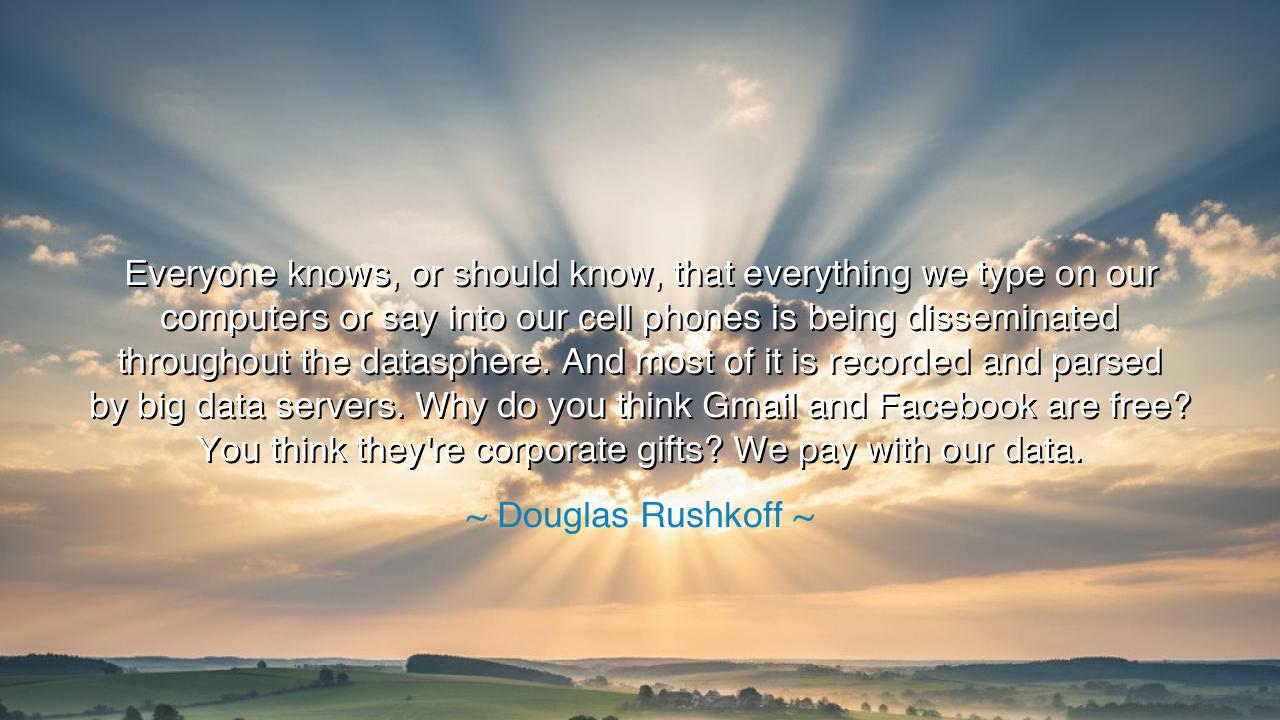
Everyone knows, or should know, that everything we type on our
Everyone knows, or should know, that everything we type on our computers or say into our cell phones is being disseminated throughout the datasphere. And most of it is recorded and parsed by big data servers. Why do you think Gmail and Facebook are free? You think they're corporate gifts? We pay with our data.






“Everyone knows, or should know, that everything we type on our computers or say into our cell phones is being disseminated throughout the datasphere. And most of it is recorded and parsed by big data servers. Why do you think Gmail and Facebook are free? You think they're corporate gifts? We pay with our data.” — Douglas Rushkoff
Hear, O children of the digital dawn, the words of Douglas Rushkoff, philosopher of the modern machine, who peers into the heart of our luminous networks and reveals the hidden price of our convenience. In this saying, he unmasks the illusion that the digital world is a gift freely given. He reminds us that every message sent, every photo shared, every whisper spoken through our devices, flows into a vast unseen current — the datasphere. And in that current, our words, our choices, even our silences, are gathered, studied, and sold. For though we believe we dwell in freedom, many walk as merchants unaware, trading the gold of their privacy for the silver of comfort.
In the days before the great digital empires, trade was simple: coin for goods, labor for reward. But in the age of Big Data, the exchange is no longer seen nor felt. We think ourselves users of free services, yet we are in truth the product — our thoughts, our habits, our desires, measured and mined like veins of ore in the mind’s soil. When Rushkoff asks, “Why do you think Gmail and Facebook are free?” it is not mockery, but revelation. For these tools, wondrous and swift, are not gifts from the gods of technology. They are contracts written in invisible ink, binding us to unseen harvesters who trade in information — the new currency of control.
Consider the tale of the Trojan Horse of ancient Troy. A marvel was presented at the city gates — a gift of beauty, promising peace. Yet within its hollow heart, soldiers slept, waiting for night to fall. So it is with the free platforms of our era. They arrive adorned in ease and connection, offering community, laughter, and endless discovery. But within their structure lie watchers — algorithms that never sleep, systems that learn our desires better than we do. We welcomed the gift into our homes and hearts, and in doing so, opened the gates of our privacy. The conquest was not by sword or siege, but by seduction.
Rushkoff, like the prophets of old, does not condemn technology — he warns us to awaken. For knowledge, he teaches, is not enslavement; ignorance is. To know that data is currency is to reclaim power. The wise do not refuse the tools of their time, but use them with eyes open and purpose clear. Just as the sailors of old learned to navigate storms by reading the stars, so must we learn to sail the seas of the datasphere, knowing where our information flows and why. The danger lies not in connection itself, but in forgetting who controls it.
And yet, we are not powerless. In this same datasphere, truth can also travel, light can also spread. The same tools that harvest can also heal — if guided by wisdom. The key lies in awareness: to ask, before every click and every share, “Who profits from my attention?” For attention is the new gold, and those who control it shape the world. When Rushkoff speaks of paying with data, he asks us to see our worth — to understand that what we give freely is of immense value, not only to commerce but to the very design of reality.
Think of the man who learns to read the contracts he once signed blindly. Once, he was a servant; now, he is a partner. So too must we become conscious participants in the digital exchange. Guard your privacy as you would your name. Protect your data as you would your family’s home. Choose tools that respect your consent. Support technologies that honor transparency over manipulation. And when you share your life online, do so not in ignorance, but in sovereignty — as one who knows the worth of his own voice.
For the wisdom of Douglas Rushkoff is not a call to retreat, but to awaken — to remember that the datasphere is not an enemy, but a mirror. It reflects what we give it, and what we allow it to take. If we surrender our awareness, it becomes a cage. But if we act with intention, it becomes a realm of light — a network not of control, but of creation. Therefore, O children of code and current, let this be your creed: use technology, but never let it use you. Know the cost of your “free,” and pay not with your soul. For the wise do not fear the web; they learn to weave it — thread by thread, choice by choice, truth by truth.






AAdministratorAdministrator
Welcome, honored guests. Please leave a comment, we will respond soon